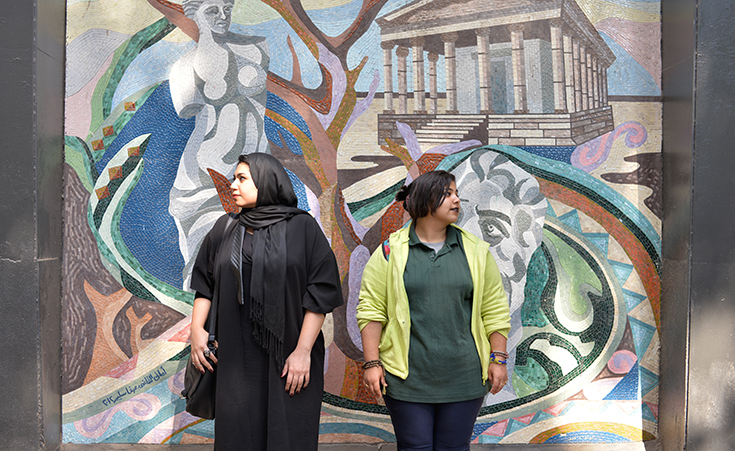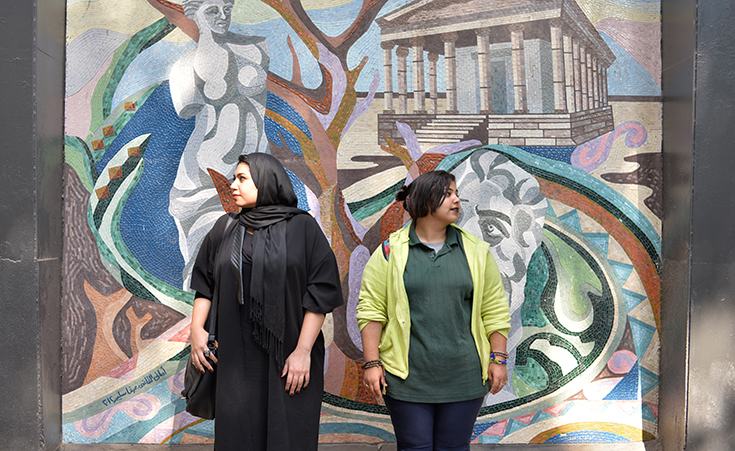A staggering 70% of the adult population is obese in Egypt. Publicly shamed, ill-advised, and often unable to exercise in private or public spaces, Egyptians seldom find a solution to a condition that can lead to a wide array of chronic diseases.
Nov 12,2015

Bassant El Qassem walks the streets of Haram, her long black 3ebaya swinging left and right. She is carrying a pack of snacks but as she comes across a passer-by, her jaw drops. “Kefaya akl!” (enough food!), says the complete stranger. As she makes her way, her gaze on the floor, a taxi driver passes by and screams “ya gamoosa.”
Her personal experience in the streets of Cairo, at university, and even in her own home, resonates with millions of women and men across Egypt who suffer the stigma of being overweight. According to a 2014 study by British medical journal, The Lancet, a staggering 70 per cent of Egypt’s adult population suffers from obesity, a statistic that places it as the 7th most obese country worldwide, where about 56.5 million people are considered to be overweight.
A health hazard fuelled by dysfunctional eating habits, a marginal culture of exercise, and societal taboos related to women’s figures, obesity is considered by specialists not a disease but a major risk factor for chronic illnesses, such as high cholesterol, diabetes, and heart disease. “Ageing is inevitable but getting sick with chronic diseases is, most of the times, a way of life and choice,” says Fayrouz Youssef, nutritionist and Founder of The Daily Crisp.

In Egypt, exercising in the streets is limited by harassment and lack of public infrastructure.
According to the specialist, the main cause of obesity is “over-eating and not moving enough to burn the excess of calories,” a practice that is reinforced by lack of knowledge and misconceptions. “Many people who have gained weight choose to eat only once or twice a day, thinking that this will help them lose it; but in reality, this just slows their metabolism. Depending on highly processed products labeled as ‘diet’ is another common mistake,” she says.
In Egypt, the condition is often linked to cultural practices and traditional dishes based on fats and sugar. “We have a sweet tooth,” admits Youssef. “You go to a gathering and everyone brings 20 cakes and we end up eating all of them. Most of our outings and events and happenings revolve around food, and most of the time it’s unhealthy food.” However, the nutritionist stresses that the cause of obesity in Egypt is not as much related to the type of food consumed, but rather to the way it is cooked; although the ingredients used in Egyptian cuisine can make for a healthy meal, as most of the dishes have a vegetable base or side, it is the excess fat and frying used when cooking that makes them unhealthy.
A growing stigma
“The phenomenon of obesity is increasing in modern societies due to unhealthy eating habits related to the rising rhythm of life. Not only does it represent a major health hazard, but also a social stigma,” says Dr. Fadi Yacoub, Medical Director of Alexia Clinic and Associate Professor of Plastic Surgery at Cairo University.
“Verbal attacks happen in shops, public transport, the streets, and even at home,” says El Qassem, who fights street harassment and verbal violence through dazzling paintings of plus-size women wearing sexy garments. “Taking care of your body starts by appreciating it; women should feel better about their bodies and themselves,” she says.
Her Facebook page, entitled Love Yourself, You’re Beautiful, is followed by 40,000 Egyptians who share their grieving experiences with the 24-year-old artist. “Some women have not left their house in six years to avoid the cruelty and verbal abuse they suffer,” she says, “But many people also write to insult me, saying I look like an elephant, or like a bus.”

The young artist fights stigma and verbal violence through beautiful drawings of plus-size women.
In a country where registering at a gym is a luxury reserved for high-end sectors, and exercising in the streets is limited by harassment and lack of public infrastructure, only a small segment of the Egyptian population actually do physical activities regularly. “Although there are some people who really care about their health and fitness, most people don’t feel the need to work out or be active unless ordered by a doctor to lower cholesterol or cure a chronic disease,” Youssef explains.
Ben Ewig is an American fitness specialist who moved to Port Said driven by the aim to inspire youth and build a culture of fitness to fight widespread obesity and diabetes in the country. Having founded CrossFit Proactive, the expert in Exercise Physiology now plans to establish a nutritional counseling programme called NutriFit, as well as CookFit for cooking classes in the near future.
“The main mistake Egyptians make is not their terrible eating habits or lack of exercise; it’s the lack of knowledge and pro-activity,” he says. “They are often given wrong advice from doctors or rely only on information from the Internet. And the few people that are given the correct knowledge are often not proactive in carrying it out. They forget that they themselves have to take action and wage war against society, advertising, and even their own ‘mama’s cooking’, which is probably the hardest one. We have to teach the Egyptian mothers that vegetables and meat on their own can make a complete meal; and that just because their son does not want more, doesn’t mean they don’t like mama’s food.”
The fitness specialist, a finalist of this year’s ElFit cross fitness competition, says that even though the American Medical Association (AMA) defines obesity as a disease, he does not consider it such. “Obesity is a preventable, and completely reversible lifestyle that can cause diseases. When people believe obesity is a disease that they are ‘stuck with’, they turn to doctors and medicine to treat the symptoms instead of proactively attacking the problem with vigorous exercise and quality nutrition,” he says.
Quick fixes and lifestyle changes
According to the World Health Organisation (WHO), obesity can be determined through the body mass index (BMI), an index of weight-for-height measurement obtained by dividing a person’s weight by the square of the person’s height. When the result exceeds 30 kg/m2, the person is considered overweight. “The biggest obstacle is that most doctors give people a diet that will help them lose weight fast, but it doesn’t help them change their eating habits and maintain a healthy lifestyle,” says Youssef. “People want a quick fix, but they don’t want to understand why or how. There is no nutrition awareness for people to understand how to turn their lives around for good, but instead people live their lives yoyo-dieting between different dieticians searching for the magic pill.”

“Some women have not left their house in six years to avoid verbal abuse. Women should feel better about their bodies and themselves,” says Bassant El Qassem.
Dr. Fadi Yacoub, who runs a clinic specialising in surgical procedures, indicates that surgery for obesity should only be considered in cases of morbid obesity; that is, when the Body Mass Index surpasses 40, and when attempts for dietary control have failed for at least two years. “The primary line of treatment is dietary control, which includes both a changing of eating habits as well as lifestyle moderation, including physical activity and training,” he says.
The specialist points out that aesthetic surgery has no role in treatment for obesity in general, although it does play a major role in the treatment of localised obesity in specific areas. “It is here where liposuction and liposculpture are the main line of treatment to achieve a new figure,” he explains. According to the specialist, the role of aesthetic surgery is not the treatment of obesity, but the procedure is key player in the treatment of localised fat, post immense weight loss, and post-pregnancy redundancy. “As patients with massive weight loss lose a significant amount of weight, surgery becomes a ‘must’ – to do tummy-tucks, breast liftings, arm and thigh lifts, due to the excess skin, as well as whole body lifts,” he says.
The best answer to losing weight, the specialists agree, is a combination of physical exercise and healthy meals. “My advice is to follow a customised nutrition program that is done by a professional; talk to your dietitian and tell them that you don’t want a quick fix but rather a long healthy life,” Youssef stresses. “Don’t overwhelm yourself with so many changes, give yourself a realistic deadline that fits your life and not anyone else’s. Take it one day at a time to change and educate yourself and see what works best for your body and you won’t believe the changes that you can make.”
Photography by Ahmed Najeeb.
This article was originally published on Cairoscene



Leave a Reply